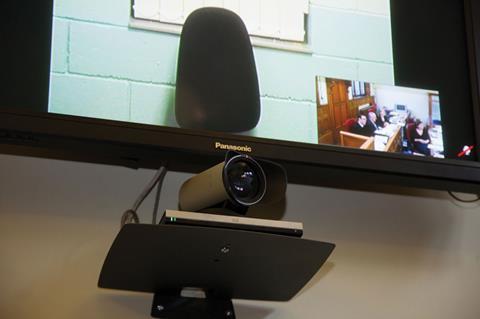The Ministry of Justice has announced a video pilot in respect of tax appeals to be launched in the spring. This will permit members of the public to have their appeals held via video. Much was made, correctly in my view, of how this will reduce cost, improve access to justice and speed up cases.

Although the MoJ stressed that the courts service was working closely with the judiciary to ensure that the majesty of a physical courtroom will be upheld, there was nothing said about the facility of lawyers to be able to participate in such hearings alongside their clients. Now, it may be that the presence of lawyer representatives is low to non-existent in such hearings, but then the pilot will not tell us much about how video can be used more widely in the justice system, whether civil or criminal.
The MoJ outlined how video is already being used in criminal cases, to assist victims and witnesses to give evidence without having to come face to face with the accused. That is good news, too, but still does not incorporate the role of lawyers. Unless the role of lawyers is brought into the pilots from an early stage, there will not be useful evidence acquired to assist the government in making the wider system ‘quicker, smarter, and much more user-friendly’.
This needs to be highlighted, because there are special difficulties arising out of the use of video when lawyers represent clients. There are also wider difficulties beyond the role of lawyers. Although the MoJ may say that it has to begin somewhere, and that it cannot incorporate all difficulties into the first pilot, the inclusion of lawyers should be a primary consideration.
The main issue for lawyers is that they should be able to sit together with their clients. If this is not possible given their respective locations, arrangements should be made to enable the lawyer to participate by video from another location. One of the chief reasons is to allow the lawyer and client to confer confidentially, subject to the usual court rules. There will need to be provision for such confidential conversations even if the lawyer is located remotely from the client. On the other hand, care must be taken that the participant is not able to confer improperly with anyone else during the session.
But there are more general problems which should be tested at an early stage. For instance, arrangements will need to be made to ensure that all participants can see whatever material is presented during the video session. If an item has to be shown to a witness, further problems may arise: should there not be an independent person present with the witness (such as a court clerk) to ensure that the witness is looking at the right part and not looking at other parts, especially those which have not been disclosed to the defence or other parties?

What if a party or witness is not a native speaker and may also be subject to different cultural influences? The judge might not be able to examine properly the nuances of appearance and responses through a video link.
Technical arrangements must also ensure that the video link is protected from hacking, meaning that videoconferencing services available to all, such as Skype, will not be suitable.
There are many pilots and projects on this and similar areas within the EU. The government has said that it wishes to continue the closest cooperation in civil and criminal justice with the EU after Brexit. There are templates now being developed for cross-border electronic proceedings, including in videoconferencing, which our government should follow closely, or else face being locked out of future cooperation through interoperability.
The European Commission’s e-justice portal has a wealth of material on videoconferencing in civil and criminal justice. For instance, the European Council issued a document in 2015 on ‘promoting the use of and sharing of best practices on cross-border videoconferencing in the area of justice in the Member States and at EU level’ (2015/C 250/01), and there is a booklet and a guide with useful technical and other information.
The portal even has information on national facilities for justice videoconferences. It tells us that in England and Wales (at the end of 2016, when the information was last updated): ‘There are 1,800 video links operational in the courts across England and Wales, mostly in the criminal courts but there is also some availability in the civil courts. 500 of these are witness rooms suitable for giving evidence from.’
So, let us zoom ahead in this field. But let us keep the interests of lawyer participation at the forefront, and also bear in mind future cross-border proceedings.
Jonathan Goldsmith is Law Society Council member for EU matters and a former secretary general of the Council of Bars and Law Societies of Europe. All views expressed are personal and do not necessarily reflect the views of the Law Society Council



























No comments yet